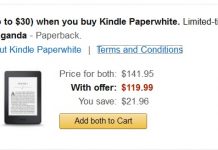 By Andy Richardson, CEO of Influential Software
By Andy Richardson, CEO of Influential Software
Last week, Amazon announced that it was extending its controversial e-book lending scheme, the Kindle Owners’ Lending Library, to the UK. In its current state, Kindle Lending Library is a value-added service to Amazon Prime, the premium delivery service for which the e-commerce giant charges £49 a year here in the UK. It allows users to ‘borrow’ one of a selection of 200,000 Kindle e-books at a time for free each month (or for the equivalent sum of £4.08 per e-book if you don’t make use of Amazon’s delivery service that month).
Some publishers reacted with horror to the launch of the Kindle Lending Library in the U.S. last year, not so much because they objected to e-book lending per se, but because Amazon had made titles available to the service without seeking their permission. Amazon had, they argued, applied a very loose interpretation to its contracts with publishers that it felt gave it a legal basis to launch the service on an “act first, ask forgiveness later” principle by which so many tech juggernauts govern their businesses.
As ever with rows involving the book business, the argument boiled down to money: namely how much Amazon would pay the publisher per e-book, and whether by negotiating a different ‘rate’ for open-ended e-book loans rather than sales, publishers risked further devaluing their own businesses. I would argue, however, that the way the Kindle Lending Library has developed to date makes it a minor victory for publishers. In its coverage of the UK launch last week, The Bookseller reported that Amazon was paying publishers the standard wholesale rate for each e-book ‘borrowed’ via the Kindle Lending Library. And the fact that the company many publishing insiders only half-jokingly refer to as Voldemort has agreed to do this suggests it needs the content enough to let publishers set the margins.
Some would argue that this is a ‘thin end of the wedge’ position, and that Amazon is determined to get publishers hooked on e-lending revenues (just as it is arguably doing by offering steep e-book discounts) before forcing them to accept smaller margins. This may be Amazon’s intention, but it’s only inevitable if publishers lose their nerve and relinquish their currently very strong bargaining position.
Why is Amazon willing to accept this? There’s one very probable reason. That is that Amazon Prime is, like many ‘value-added services’, crazily profitable. And it can only be that profitable if most of its users pay for a level of service they don’t really need. Just like the ‘platinum’ bank accounts that sell us phone or travel insurance we never claim on, it could very well be that most Prime customers never use anywhere near as much as £49 of next-day deliveries or e-book loans per year. If Amazon does bank a healthy margin on Prime customers, it makes sense for it to use any tactic necessary to expand the pool of users—even (heaven forbid) paying publishers a fair price for their product.
Another observation to make here is that the expansion of the Kindle Lending Library in its current state is potentially a far greater money-spinner for UK publishers than the public library system. After all, when a library acquires a physical book, they usually buy it at the wholesale price, which nets the publisher a royalty, but on a one-time only basis. That same book could go on to be read dozens or even hundreds of times with no further monies being paid to the publisher (even though authors are paid under the PLR scheme here in the UK). Under Kindle’s scheme, however, the publisher and author get paid for each individual loan.
Publishers do have good reason to be wary of Amazon which, like any over-mighty retailer, never hesitates to leverage its position as the gateway between the product and the mass-market. What the publishing industry does have on its side in the case of the Kindle Lending Library, however, is the opportunity to negotiate a lasting economic settlement with Amazon at a time it needs publishers’ content more than those publishers need to make it available to them. By the looks of things, Amazon will do practically anything to expand the lavish profits offered by Prime, and publishers should work to exploit their eagerness.
* * *
About Andy Richardson & Influential Software:
 Influential Software is an IT consultancy set up by founder and CEO Andy Richardson in 1993. It has 35 staff in the UK, with offices in London and the South East. The company has been working with businesses across all sectors for 20 years on scores of successful projects that range from enterprise-level business intelligence and data-warehousing to ERP solutions, vendor selection exercises, bespoke software development and the supply of skilled contract staff.
Influential Software is an IT consultancy set up by founder and CEO Andy Richardson in 1993. It has 35 staff in the UK, with offices in London and the South East. The company has been working with businesses across all sectors for 20 years on scores of successful projects that range from enterprise-level business intelligence and data-warehousing to ERP solutions, vendor selection exercises, bespoke software development and the supply of skilled contract staff.
—
Follow us on Twitter @TeleRead
Join us at facebook.com/TeleRead

































The KOLL is not available to all Prime members. To borrow books, you must also own either an e-ink Kindle (any model, including the DX) or a Kindle Fire. In fact borrowing must be initiated from the Kindle itself; you can’t use a Kindle app unless you count the one on the Fire. In a way it makes sense, as those folks are less likely to use the 2-day free delivery when they order books, as they’re more likely to buy Kindle books than print.
I would argue, however, that the way the Kindle Lending Library has developed to date makes it a minor victory for publishers.